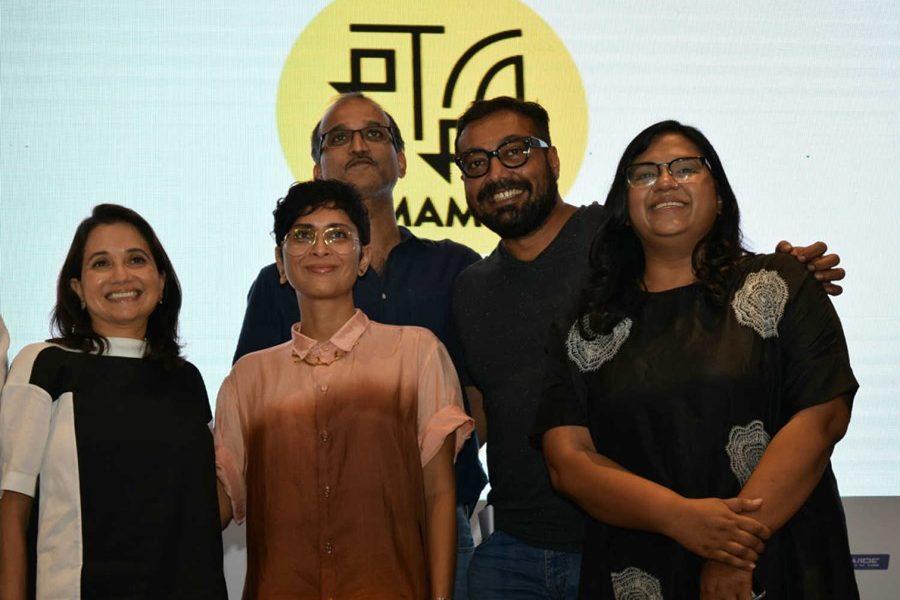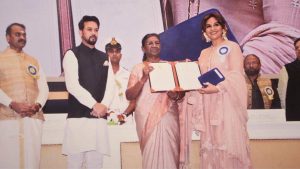
MAMI Chairperson Kiran Rao and festival director Anupama Chopra led a press conference along with Siddharth Roy Kapoor, Rohan Sippy and Anurag Kashyap on Thursday in Mumbai to announce the films and events which would be a part of the upcoming MAMI [Mumbai Academy of the Moving Image] festival. While interacting with media, Kiran stated that stigma about film industry is sad.
When asked there are still reservations of Indian parents who doesn’t want their children to pursue art as a profession, to that, Kiran said, “Our interaction about this issue has been different across different cinema culture. There are places other than India, where families say don’t go to film industry and it’s not good industry to be part of. There are countries of long history of art and culture where theatre, music, dance and cinema is very prestigious. We as filmmakers are proud to call our self artists”
“We believe that in our country it has become much acceptable but in India, we hope people look at cinema as another form of art. People should come forward not just to look at it just for glamour and money but to look at it as an art form something that can enrich people’s life, which can really spark ideas and conversations. As a country we have had cinema as long as cinema has existed and to still have stigma about it film industry is sad”
“I know it still exists in places and we will battle it. There arelot more of us their now, who watched films to make kinds of cinema that they want to make so it’s slow but I think it’s going. I don’t really know about the rest of the world but I think it’s changing in India.
Typically when audience looks for films, there is big divide between what is considered as festival film or Indie film versus main stream commercial cinema especially in terms of box-office and what happens often that a certain film gets good review at festival but when they release in theatre they struggle so when asked what MAMI’s role in helping that transition or shift happen. Kiran said, “This exists pretty much in the world. So called artistic cinema, non-mainstream cinema generally tends to go to specialty cinema and doesn’t play as broadly as commercial cinema.”
“In India, Indie film has to fight battle with big ticket film. It’s an expensive battle and not many can get into it. MAMI would really like to fill that gap. In our initial discussions, we decided that, we should be gateway to Indian cinema and we are proud to bring well curated and good films in our Indian section. We want to give our Indian section as much importance as all these big world cinema titles that comes.”
“We did screening of films like Trapped or Mukti-Bandhan otherwise; it wouldn’t have got wide release that is something unfortunately big films also face. We country of our size has too few cinema then within that smaller cinema to get theatre is even harder”
“We want to bolster distribution of Indian independent cinema which we feel big gap in our county. There isn’t a well developed system of distribution and exhibition of Indian independent cinema both in India and in abroad so we are working on that. Moreover we want to change Indian audience perception. We want people to say if certain film is screened at MAMI then it must be a good film. The younger generation is anyway consuming this kind of cinema on digital and on other mediums”
Opening film of AMAMI is film of Anurag Kashyap directed Mukkabaaz, so when asked if a filmmaker attached with festival so closely does that lead to conflict of interest and what’s the procedure to maintain objectivity in terms of evaluating films, Anupama said, “We know Anurag is closely associated and great supporter of this festival but it doesn’t compel us in any way. We watch the film and subsequently liked his film so we thought it would be great opening”
Anurag added, ‘”When members of MAMI watched my film then they decided to make it an opening film then I said to them that I want to seek my producer Anand L Rai’s permission for this because in India, being a film within mainstream it also deals with conflicts with lot of other things but once it was finalized, it was moment of pride for me and I was very happy because my film never played at MAMI and because of that I lost big Asian premiere at Bhusan and for me that was the choice I made which is very big thing”
The 19th Mumbai film festival will screen 232 films from 49 countries in 51 languages, from Hindi to English, Samoan to Brij. Dipesh Jain’s In The Shadows (Gali Guliyan), Devashish Makhija’s Ajji, Shlok Sharma’s Zoo and Rima Das’s Village Rockstars are some of the Indian films competing in the India Gold section. While Colombia’s Bad Lucky Goat, Turkey’s More (Daha), USA’s Quest, Spain’s Summer 1993 and South Africa’s The Wound are amongst those competing in the international section.
The MAMI Mumbai film festival will from 12 to 18 October.





